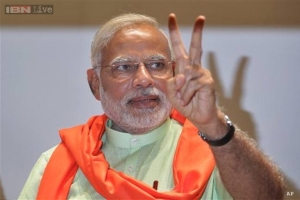 NDTV
NDTV
16 May 2014
The promise, and peril, of Modi’s mandate
Siddharth Varadarajan
If the struggle of Narendra Modi for power is the struggle of forgetting over memory, his victory represents a collective leap towards an uncertain future.
Mr Modi’s remarkable election campaign may have been fuelled by unprecedented sums of money and magnified by the logic of the first-past-the-post system — which converted a 12 percentage point difference in vote share with the Congress into a 600 per cent difference in seats – but it has helped him banish, for all intents and purposes, the lingering shadows of a darker past.
Troubling questions about his record that were met earlier with menacing silence or anger, but never answers, can no longer be asked. With the absolute majority Mr Modi has now delivered for the BJP, a new ledger of accounts has been opened. Any audit of his record will henceforth be on his own terms.
Narendra Damodar Modi asked the electorate for 272+ seats and they have given it to him. He asked voters for a ‘Congress-mukt Bharat’ – an India free of the Congress – and they have handed it to him. So reviled was the Congress-led United Progressive Alliance government and so terrible its record of governance that the party has justifiably suffered the worst defeat in its 129-year history.
The ‘Modi Wave’ left nearly 60 per cent of the electorate cold and failed to make a major dent in those states where regional parties still enjoy a high degree of credibility with voters like Tamil Nadu, Odisha and West Bengal but it has wrecked the Congress everywhere. The wave swept through Uttar Pradesh, where it also managed to draw away voters from the Bahujan Samaj Party if not from the Samajwadi Party, and of course Bihar too.
With the Congress winning less than 55 seats, the 16th Lok Sabha will not have an Official Opposition or a formal Leader of the Opposition. Ever reluctant to shoulder responsibilities in a competitive environment, Rahul Gandhi is once again off the hook. But the question of an effective opposition so essential for democracy is not merely a formal one.
Taken together, MPs from national parties like Congress, the Left and the Aam Aadmi Party will barely add up to 60.
Regional parties like the AIADMK, the TRS and the Biju Janata Dal, which are non-ideological, or the Trinamool Congress, which veers towards populism but is essentially Bengal-centric, are unlikely to show much interest in, let alone challenge, the Modi government on a large number of crucial areas of policymaking.
http://svaradarajan.com/2014/05/16/the-promise-and-peril-of-modis-mandate/
Posted By F. Sheikh
